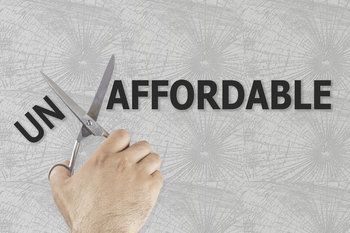 A mortgage modification can help if you have fallen behind on your mortgage payments. It can:
A mortgage modification can help if you have fallen behind on your mortgage payments. It can:
- restructure your home loan so you pay less each month.
- reduce the principal balance on your mortgage
- allow you to refinance, even if your loan's underwater
If you're struggling to keep on top of your mortgage, this is a must-read article.
Mortgage delinquency: things got better...
A decade or so ago, rates of mortgage delinquencies, defaults and foreclosures were constantly in the headlines. The Great Recession meant many homeowners lost their jobs, had their working hours cut or otherwise lost income. And politicians scrambled to put in place assistance programs to help those people ride out the storm.
Today, with the economy pretty solid and home values near record levels, you rarely hear about those with problem mortgages. Mortgage delinquency rates (accounts more than 30 days past due) are at very low levels, with only about 2.8% of outstanding mortgage loans in arrears in January 2024, according to Cotality (formerly CoreLogic).. This is just a little above record lows for this series, a bottom of 2.6% set in May 2023.
Related: Is Forgiven Mortgage Debt Considered Taxable Income?
...but still aren't perfect
With roughly 60 million or so mortgages outstanding, this translates into potentially millions of homeowners struggling to make mortgage payments on time, or at all.
Molly Boesel, the principal economist at CoreLogic, noted that "Nationwide, the overall mortgage delinquency rate held steady in January 2024, and the serious delinquency rate fell from a year ago. However, one-third of metros posted an increase in the overall delinquency rate from one year earlier, and a handful reported an increase in serious delinquency rates [... this] could be a sign that borrowers are experiencing budget strains."
Falling behind on your mortgage is a personal disaster, regardless of where you live or how other people are faring. If you're struggling to keep up with your payments, you're likely living with extraordinary stress as you deal with the fear of possibly losing your home. Luckily, help might be at hand through some of those Great-Recession-era programs that have survived. So what might be available to help you?
The Flex modification program -- qualifying
Before getting too excited about the Flex modification program you need to know three things.
- Your lender must participate in the program. Call your mortgage servicer (the company to which you make payments) to check.
- You must be at least 60 days delinquent with your mortgage and be at risk of defaulting before you can be considered.
- Your mortgage must be owned by Fannie Mae or Freddie Mac.
Many homeowners are unaware of who owns their loan. That's because mortgages are routinely traded on secondary markets. And yours may have changed hands without your noticing.
Don't worry. There's an easy way to find out. Because both Fannie and Freddie have lookup tools on their websites intended for homeowners who need to check. So visit Fannie Mae's and Freddie Mac's loan lookup tools to see if either owns your loan.
Related: See more details about Flex Modifications
The Flex modification program -- benefits
Let's assume you've cleared those hurdles. What help might you get from a Flex mortgage modification?
Don't assume you'll get both benefits -- or either to its maximum extent. But here's what's on offer:
- A reduction in your monthly payment of at least 20% -- the goal is that your total homeownership costs (mortgage, property taxes, homeowners insurance, homeowners association fees ...) shouldn't exceed 40% of your monthly income before taxes.
- A reduction of up to 30% in your mortgage balance -- this time, the goal is to bring your mortgage balance down so that it's between 80% and 100% of the market value of your home. For easy math, let's assume you currently owe $100,000 on your mortgage. You could soon owe $70,000.
How are those achieved? There are three main ways, which might be used in combination. And you personally may benefit from one, two or three of them:
- The lender simply writes off and forgives part of your balance. It's called "principal forbearance".
- You get longer to pay down your mortgage. Suppose you currently have a 30-year loan. That could go up to 40 years, spreading payments thinner and reducing each month's amount due.
- Your lender cuts your interest rate. If you've had financial issues, you may well have been unable to refinance down to today's low mortgage rates. This achieves something similar.
Contact your mortgage servicer for more information.
Related: Can I Modify My Mortgage a Second Time?
Government mortgage modifications
The Flex mortgage modification program is probably the biggest and most famous source of help. But it's far from the only one.
If your mortgage is backed by the government, there's a good chance you could get assistance from mortgage modification programs run by the Federal Housing Administration (FHA-HAMP), Department of Veterans Affairs (VA) and US Department of Agriculture (USDA).
These programs can try to get your monthly payments down to just 31% of your monthly income before taxes. And they use similar methods to those employed by the Flex Modification program.
Related: Streamline Refi: HARP's Replacement
Other mortgage modification assistance
Many state or local housing agencies operate their own mortgage modification programs. So call the one(s) that work in your area to see if -- and how -- you're in line for help.
By 2019, many of the old "Home Affordable" programs introduced during and after the Great Recession had been scrapped. These include the Home Affordable Unemployment Program (HAUP) and the Home Affordable Foreclosure Alternatives (HAFA) program. The FHA Second Lien program is also long defunct.
But don't give up even if there are fewer or only more targeted available programs today than there were during the housing market crash or even if your loan isn't owned or backed by Fannie, Freddie or the government. Many lenders also run proprietary mortgage modification programs for their customers experiencing trouble making mortgage payments.
Talk to your mortgage servicer, check with your housing commission(s) or talk to a housing counselor approved by the US Department of Housing and Urban Development. Any or all may have options for you.
This article was updated by Keith Gumbinger.



